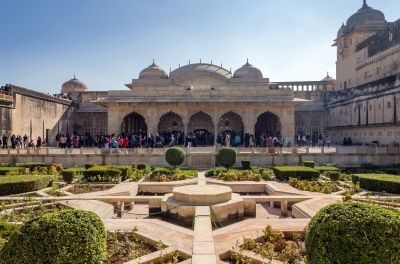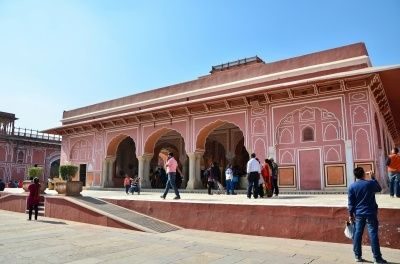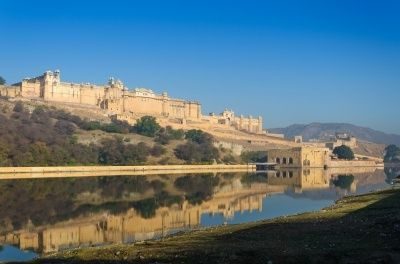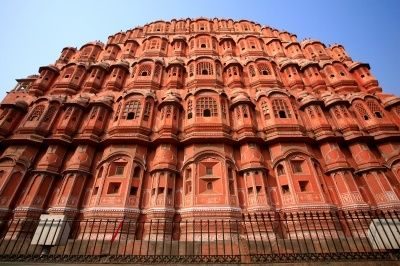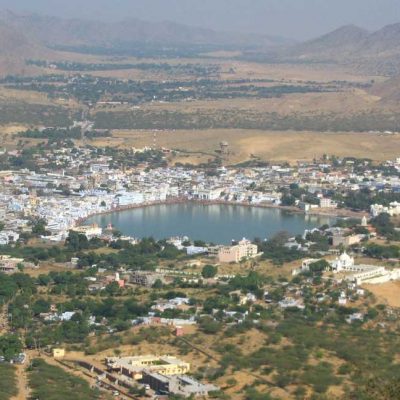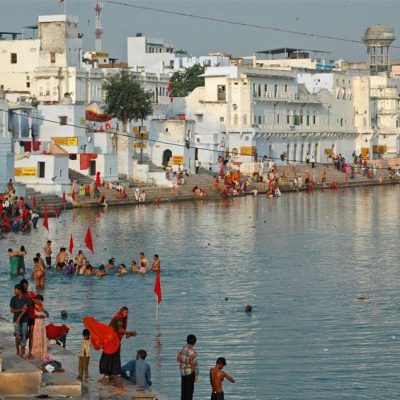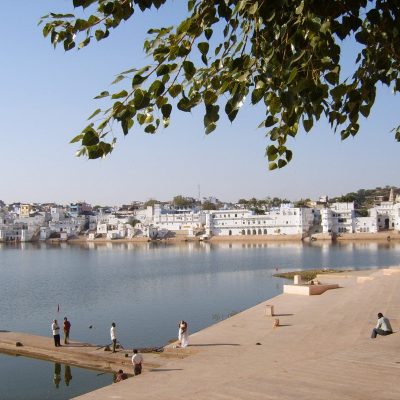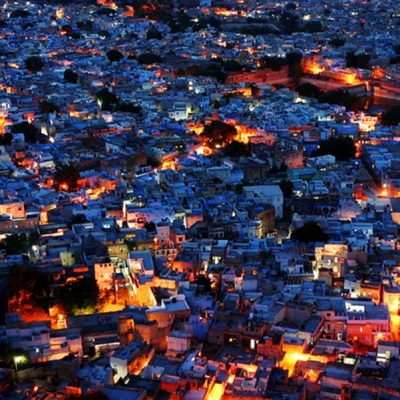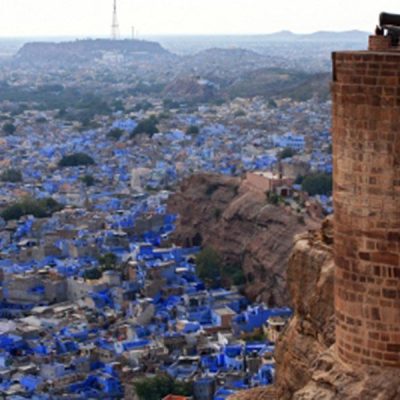rural rajasthan
11 Days
ABOUT THE ITINERARY
This trip gives you an opportunity to explore the most famous cities of Rajasthan and simultaneously discover the real Rajasthan through visit of rural villages and off-beaten destinations on spirited journeys set to open your eyes, heart and soul. Meet every day extraordinary people, immerse yourself in ancient, thriving cultures and marvel at Rajasthan’s characters. We provide opportunities for travelers to engage with local communities; see, hear and learn through interactions, stories and experiences that make this trip so unique. The tour starts in the Indian capital of Delhi, where you will have the opportunity to discover the old enchanting streets of the inner city of Paharganj thanks to the help of young guides trained by a local NGO working in favour of street children. On the way to Rajasthan you will visit the famous building of Taj Mahal, an UNESCO world heritage site, which was originally built by Mughal Emperor Shahjahan, in the loving memory of his wife. The tour will bring you to discover some of the most beautiful Rajasthani cities such as the pink city of Jaipur, the holy city of Pushkar, the blue city of Jodhpur and finally the lake city of Udaipur. While visiting those famous cities you will have the chance to explore rural villages and meet local people, discovering the diversity of cultural expression through folk dance and folk song.
The last stop on the tour will be Nawalgarh, a small non-tourist town, with its refined Haveli, a colorful bazaar and the eco-lodge for your stay, which is involved in activities that support various development projects for the local community.
When you are hungry, indulge in well-known succulent Rajasthani food and learn secret recipes. On special request, we can arrange for culinary workshops where you can engage with host, source vegetables from the market, give a hand in preparing the delicious Rajasthani dishes and sit out and have a satiating lunch/dinner with the family. During free time, stroll around the village; spend time with farmers and women who engage in different kind of activities.
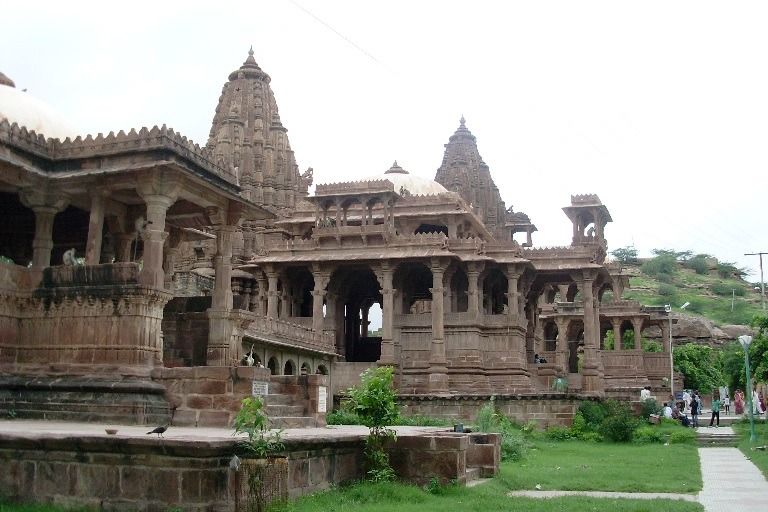
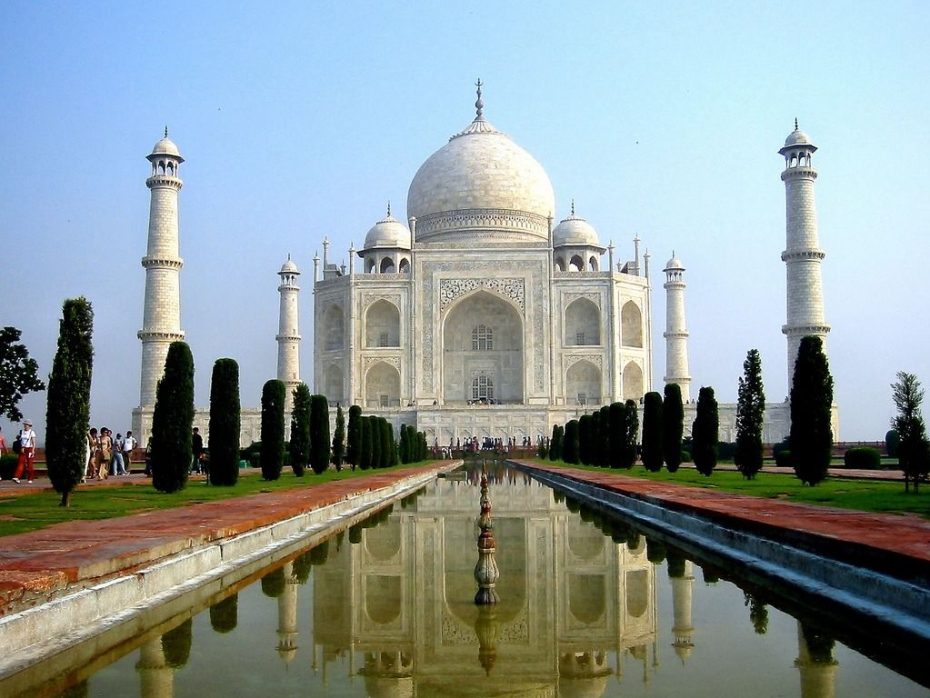
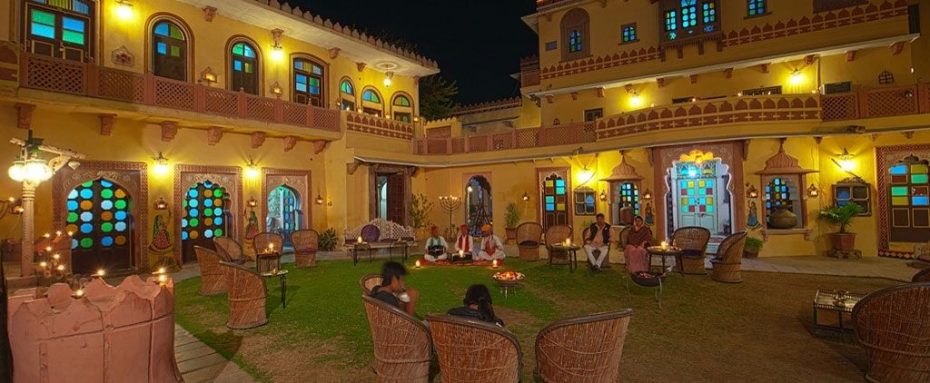
SIGN UP FOR THE TRIP
Registration can be requested for group travel or for self-travel. For group travel, registration is not binding. Upon reaching the minimum number of members necessary for the formation of the group, usually 4 or 6 people, you will be asked for confirmation of booking and payment of a deposit.
JOURNEY OVERVIEW AND PROGRAM DETAILS
1° Day: arrival Delhi
Delhi
Arrival at Delhi airport. Transfer to hotel for some rest. Around 10 am after breakfast you will start your guided tour of Old Delhi. In particular, you will visit the Red Fort (visit only from outside), a UNESCO World Heritage since 2007, built in 1639 by Mughal Emperor Shah Jahan (the creator of the Taj Mahal), the the Jama Masjid, one of the largest mosques in India, where an ancient copy of the holy Quran written on Deer skin is preserved. Visit small lanes of this part of the city such as Chawri Bazar, one of the busiest street of Old Delhi. Later visit Raj Ghat, the site of Mahatma Ghandi cremation. After lunch you will visit new Delhi with its Government buildings such as the India Gate, an arch erected in memory of the Indian soldiers who lost their lives fighting for the British Army during World War I, and the Parliament House. In the late afternoon we will continue the visit with the Gurudwara Bangla Sahib, one of the most prominent Sikh gurdwara, or Sikh house of worship in India, known as the “Sarovar.” Then trasfer to the hotel. Overnight in Delhi (D)
2° Day: visit Taj Mahal
Delhi – Agra
IIn the morning (10 am) you will visit the slums of Paraghanj (old Delhi) with the help of young guides trained by the NGO. City Walk aims to make the story of the children of the street heard and to give us a view of their world through their eyes. Participants of City Walk get to go on a journey through the enchanting streets of the inner city of Paharganj and the area around New Delhi railway station, led by a child who was once living and working on the streets. This walk takes you on a journey through the backstreets of Delhi with a child who has been fully trained as a local guide. It’s a unique way of providing an insight into the lives of these children and an opportunity for them to improve their communication and speaking skills. Afternoon drive to Agra (approx. 4 hrs. drive) via the expressway. Arrive into Agra and visit the Taj Mahal (closed on Fridays), one of the most famous and visited monument of all over India, a real epitome of love and romance… The Taj Mahal, is a UNESCO world heritage site, which was originally built by Mughal Emperor Shahjahan, in the loving memory of his beloved wife, Mumtaz Mahal. It is built in white marble as a mausoleum for his queen Mumtaz Mahal. It is now a universal symbol of love, and is one of the Seven Wonders of the World. Taj Mahal was built in the year 1653, which is symbolized by the fact that there are 16 gardens and 53 fountains. It took 16 years for this symbol of love to be completed, and thousands of artisans contributed in the making this monument. (we will visit the Taj Mahal in case next day is Friday).
Overnight in Agra. (B)
3° Day: transfer to Jaipur
Agra-Jaipur
After breakfast start to discover the most unknown parts of the Agra. Explore the old city on a 3-hour walking tour led by a local guide who shows you daily life away from the typical tourist attractions. Learn about Agra’s history, architecture, and traditions as you discover the old market and its surroundings. The first stop will be the Jama Masjid, a big mosque opposite to Agra Fort. You will continue walking along the narrow lanes of old Agra, meeting a local families living in the area. Later you will visit the ancient Manka Meshwar temple (Shiva temple), followed by the wholesale spice market, Rawatpara, where you can find Agra petha, a candy made from ash gourd. You will also observe the bustle at the shoe mandi in Johri Bazar, the only street of Ayurvedic doctors, the paan (betel leaf), and the food street of Seth Gali. Lunch in a small restaurant supported by a local NGO that helps women victims of acid attacks. Later transfer to Jaipur (4 hrs drive), the largest city of Rajasthan and an epitome of magnificence and vibrancy. This city was established in 1727 by Jai Singh II, and is India’s first planned city. Jaipur was the capital of former Kachwaha rulers and it so presents itself as a versatile tourist destination.
Overnight in Jaipur. (B, L)
4° Day: visit Amber Fort
Jaipur
After breakfast visit the Hawa Mahal on way to Amber fort. Jeep ride to the ramparts of Fort. After lunch visit the Anokhi museum and understand how handicrafts plays such a big role in rural India’s economy. In the afternoon visit the Royal palace and the ancient city. This royal place is rich in heritage, culture and architecture. With splendid fortresses, majestic palaces, tranquil temples and beautiful havelis; Jaipur turns out to be an ideal tourist destination. It is not just the royal buildings and palaces that this city offers. Other than these captivating attractions, Jaipur displays exquisite handicrafts and spectacular jewelry. These intricate works of art add life and color to this Pink City’s uniqueness. Also, the serenity of lush gardens and floral array acts as the cherry on the cake of fabulous landscapes. All this make a picturesque view that tends to enthrall any visitor. Walk around the uniquely constructed city, observatory ,bazaar and understand the history of the place.
Overnight in Jaipur. (B)
5° Day: rural project visit Tilonia
Jaipur-Tilonia-Pushkar
Drive to Pushkar (160kms, approx. 3,5 hrs. drive). En-route stop at Bagru, known for its block printed textiles. This is a good opportunity to see craftsmen/women at work. Proceed onwards to Tilonia, a small village in Rajasthan, the home of the NGO called Barefoot College. Rajasthan is truly a state of contradictions. From Havelis to rich home-stays to Heritage Palaces to Luxury Hotels, Rajasthan is also one of the poorest states in the country. If any one wonders about how such contradictions can exist in a place, the visit to Tilonia is important for us to explain the story of the ‘bare-foot-soldiers’ who are making massive social and environmental changes using local knowledge and resources. From mask making to workshops on puppetry and interaction with local people, the visit gives ample opportunity to understand the dynamics of the state that is Rajasthan that is far away from the tourism circuits. Subjects like water management, solar energy are touched during the visit. Visit the library and watch documentary film on the achievements of this social college. Lunch in the campus. Thereafter visit the Harmara village where you will meet the leather maker, spend some time in his house and watch the process of making bags and belts. You may purchase directly should you wish to. Proceed to the holy town of Pushkar. Pushkar is one of the most revered Hindu pilgrim center famous for the cattle fair and Lord Brahmas temple. The word ‘Pushkar’ means lotus flower, which is said to be the seat of Brahma, one of the Hindu holy trinity, who is worshipped as the creator of this world. Watch the evening rituals near the lake.
Overnight at Pushkar. (B,L)
6° Day: visit Pushkar
Pushkar
In the morning go for a walk inside the lanes of Pushkar; you may meet citizens from the most part of world in quest of finding the inner self. Hinduism is a thought process and this you can see it in Pushkar. Enjoy a meal overlooking the lake. Spend time visiting the Brahma temple, Jagatpita Brahma Mandir, and if you are lucky meet a Yogi meditating near the lake. The temple is one of very few existing temples dedicated to the Hindu creator-god Brahma in India and remains the most prominent among them. Although the present temple structure dates to the 14th century, the temple is believed to be 2000 years old. The temple is mainly built of marble and stone stabs. It has a distinct red pinnacle (shikhara) and a hamsa bird motif. The temple sanctum sanctorum holds the central images of Brahma and his second consort Gayatri.
Overnight in Pushkar. (B)
7° Day: transfer Jodhpur
Pushkar-Jodhpur
After breakfast drive to Jodhpur (4 hrs drive), en route visit Pokaran and visit Shikarpura village in Luni tehsil, famous for its terracotta pottery. Later drive to Mandore near Jodhpur. Arrive in Mandore and check in the beautiful heritage guest house. Here guests have a good opportunity (if they stay longer) to work with volunteers of the NGO supported by the owners. The NGO supports related to education, health care, environment, socio-economic and women empowerment. It also includes activities directed toward meeting the needs of the poor and needy – distribution of food, clothing or medicine; provision of housing for handicapped animals etc. On arrival check in and later go for a jeep safari in a Bishnoi village. Bishnoi village of Jodhpur, Rajasthan is scenic beauty marked with Khejri trees and deers. The villagers are staunch worshippers of nature in all its forms, specially the sanctity of plant and animal life. During the safari will visit families of shepherds. You will see how shepherds live in traditional way, working with animals like goat, sheeps, Camel etc. Here you will have the chance to spot wild animals in there natural habitats, many species of desert animals are found there some of them our Antelopes, Gazelle, Dumessille Crane, Rabbits, Blue Bulls, Migrated Birds, Peacocks etc. Later return to the hotel.
8° Day: visit Jodhpur
Jodhpur
After breakfast start to discover the city of Jodhpur. Jodhpur, the second largest city in Rajasthan is popularly known as the Blue City. The name is clearly befitting as most of the architecture – forts, palaces, temples, havelis and even houses are built in vivid shades of blue. The strapping forts that tower this magnificent city sum up to a spectacle you would not want to miss. You will start with the visit of the magnificent Mehrangarh Fort, which is one of the most famous in India and which is packed with history and legends. Later visit the Jaswant Thada (Cenotaph), the clock tower and the bazaars in the narrow lanes of city. Return to the hotel.
Overnight in Jodhpur (B)
9° Day: transfer nawalgarh
Jodhpur- Nawalgarh
Drive to Nawalgarh in the Sekhawatiregion of Rajasthan (approx. 6 hrs. drive). In the next two days you will have the chance to soak up the local Rajasthani lifestyle, discover the region and its traditions and interact with local people. On arrival check in the hotel and after some rest you will visit the village, which offers a small-town feel and some of the region most outstanding havelis. You can go on village walks and visit old palatial mansions. There are more than 200 old havelis in Nawalgarh. Fresco work at these havelis create an amazing art work. In the late afternoon cookery class at Apani Dhani with some of the members of the lodge. Overnight at Nawalgarh. (B,D).
10° Day: visit Nawalgarh
Nawalgarh
After breakfast you will attend an introductory workshop of local art and crafts led by villagers.It isa a privileged moment of exchange. The “tie-dye” workshop, is a traditional technique of dyeing textile from Rajasthan and Gujarat. This interactive workshop led by a local craftsman, will provide an introduction to this skill. You will discover every step, from printing simple patterns to dyeing and make for yourself or your near and dear, some pretty scarves. Later in the afternoon camel ride through the Nawalgarh countryside to Dundlod. Visit the village and return to the hotel. In the evening dinner will be accompanied by a small concert of Indian classical music performed by local musicians. Overnight in Nawalgarh. (B, L, D).
11° Day: transfer delhi
Nawalgarh-Delhi
After breakfast, a cooking class will be held by a member of the eco-lodge family and lunch preparation. Transfer to Delhi airport (about 5 hours, 270 km) and departure by international flight.
ACTIVITIES
- explore the Indian capital Of New Delhi
- visit one of the most famous buildings in the world, the Taj Mahal, the epitome of Mughal art
- discover the pink city of Jaipur, the capital of Rajasthan
- go for fair shopping at Bagru village, where you can buy hand blocks prints directly from local textile artisans
- learn how Barefoot College of Tilonia is working to improve the lives of the rural poor
- meet the leather makers in Harmara village, while exploring their ways of making bags and belts
- visit the holy town of Pushkar, one of the most revered Hindu pilgrim center famous for the camels fair and the Brahmas temple
- discover the development projects or do some volunteer work at the NGO of Mandore
- visit the magnificent Mehrangarh Fort and the bazaar of the Blue city of Jodhpur
- Visit the traditional village of a city known as Nawalgarh and its precious Haveli
- explore the Shekhawati region and participate in local initiatives, such as camel treks
- admire a beautiful sunset on Pichola Lake
- cultural performances and activities
- historical and archaeological sites sightseen
JAIPUR
Jaipur, the Pink City, is undoubtedly the must visit destination in Rajasthan. The ancient forts and palaces and unique architectural splendors not only win the heart of the visitors but also ensures a memorable vacation. Jaipur is also an important part of the popular Golden Triangle Tourist Circuit of India. The remnants of a bygone era charm the visitors and provide them the glimpses of the regal lifestyle enjoyed by the reigning monarchies.
PUSHKAR
In spite of being a sleepy little holy town, Pushkar attracts numerous backpackers and hippie types travelers from all across the globe. If you want to see the true colors of the town, try to visit during October-November when the Pushkar Fair, the largest camel festival in the world is organized. Moreover, the town is worth a visit throughout the year. After exploring the religious ghats of Pushkar, do not miss to visit the vibrant markets. You may purchase traditional and handmade items and artifacts as souvenirs and gifts.
JODHPUR
The blue painted buildings are the reason Jodhpur is popular as the “Blue City”. The 2nd largest city of Rajasthan is known for its rich architectural splendors and cultural heritage. The Mehrangarh Fort is one of the major attractions in the city.
The fort is also acclaimed as the largest fort in the country. In the month of October every year, the Rajasthan International Folk Festival (RIFF) is organized in the city. There are numerous palaces and museums in the fort. Visitors can also enjoy the mesmerizing view of Jodhpur’s blue buildings
SOCIAL AND ENVIRONMENTAL IMPACT
Rajasthan is truly a state with contradictions. From Havelis to rich home-stays to heritage palaces to luxury hotels, Rajasthan is also one of the poorest states in the country. If you wonder about how such contradictions can exist in a place, the visit to the Barefoot college in Tilonia will give you several answers thanks to the story of the ‘bare-foot-soldiers’, who are making massive social and environmental changes using local knowledge and resources. However, all the itinerary has been designed in order to promote direct or indirect benefits for local communities, environmental conservation and protection of cultural heritages. When possible we have selected traditional accommodations sensible to social and environmental issues, following general principles and practices of responsible tourism. One of the main principle on which we have selected the infrastructures where you will be host during this tour is based on the protection and safeguard of local traditional architecture. In this way we intend to use the cash flow coming from the tourism to value the protection of historical and traditional buildings, using some of these renovated building as hotels during your trip. Thanks to the economic impact of tourism it has been possible to renovate and preserve some important traditional palaces, forts and buildings of Rajasthan, which otherwise would have been destroyed or abandoned.
By including less popular destinations, we hope to equalise the tourist cash flow to some extent. Moreover, the selection of traditional heritage palaces will allow us to promote a real immersion into the traditional culture of Rajasthan, trying to foster a real cultural encounter with local communities. However, beyond the dominant culture of Rajputs, the royal caste, we rely also on the work of local NGOs or voluntary organizations as to learn about their activities, having the opportunity to discover reality and glimpses of social and cultural alternatives. You will have the opportunity to visit the chaotic Delhi with different eyes, visiting the most remote and unusual parts of the old city with the help of marginalized young people trained as tour guides by the NGO Salaam Baalak. Through the helps of these young guides you will have the chance to learn about their life experience as street children. This NGO has been working for several years in the slums and poor neighborhoods of the capital, creating several accommodations for street children and promoting their education and access to work. During the two-hour guided tour in the areas of Paraghanj, you will have the opportunity to visit these shelter homes and understand the projects undertaken by this NGO. All the itinerary is created in collaboration with the Kalakar Vikas Samiti, a small group of traditional artists who make a living out of art and handicrafts. Most of the hotels and restaurants showcase Rajasthani artists and except for a visual contact, there is real no connection with the artist. Our itinerary will give you an opportunity to understand where they come from, their art and culture. You can visit them in their houses and villages during the trip. This ensures that they don’t compromise on their dignity and perform just for the sake of making a living. Our involvement with the community ensures their capacity building, training on social skills and building networks of artists in different parts of the Rajasthan so that the benefits of Responsible Tourism is spread across the state and not restricted to certain tourist places. We organise workshops that provides an opportunity to not only learn their craft but also understand their social environment. One of the off shoots of these workshops is responsible shopping where travellers can purchase products directly without paying middle men who make unreasonable profits at the expense of the real artists. We promote responsible shopping in Rajasthan – buying local handicrafts directly from the artists, thereby ensuring that the artist gets his worth. We promote home stays so that the benefits go directly to local people.
In Tilonia you will visit some of the activities of the NGO Barefoot College, which has as its main objective to promote innovative sustainable solutions to promote the self-sufficiency of marginalized rural communities.
The main activities of NGOs are directed towards the promotion of:
- solar energy
- drinking water
- education
- economic activities
- social activism
Here you will hear the stories of the so-called “barefoot soldiers” who are making significant social and environmental change through the use of local resources. Since 1972, the College has worked to improve the lives of the rural poor by addressing basic needs for water, electricity, housing, health, education and income. Today, women from more than 50 countries in Africa, Asia and Latin America have been trained by the College to solar electrify their own communities. At Mandore/Jodhpur you will get an opportunity to work closely with the local NGO Mewar Medical and Relief Society. The volunteers are actively involved with and support projects that are secular and have an education-related component to them apart from health care, environment, socio-economic aspects and women’s issues i.e. Women in Difficult Circumstances. It also includes activities directed toward meeting the needs of the poor and needy – distribution of food, clothing or medicine; provision of housing for handicapped animals etc. Moreover, your contribution of 70 euros will support development projects in favour of one of the most marginalized tribal communities of India. Tribal communities are still at the margin of Indian society and for this reason two are the main projects financed:
- to conserve biological and cultural diversity
- to promote the formal education of children belonging to Kattunayakan community of the Nilgiri district of Tamil Nadu and Kerala
TIPS BEFORE DEPARTURE
Rajasthan is certainly one of the most famous tourist destination in India, drawing tourists from all parts of India and the world.
However, it is advised to follow a conduct which respects local culture to avoid any hassles or unwanted troubles along your journey. In particular, avoid any displays of affection in public places, such as hugging, kissing etc., as this behaviour is not appreciated by local people.
You are also advised to follow a certain dress code. There are basically two reasons why it is recommended to be careful about what clothes you wear while traveling to India. The first reason is to prevent you from hurting the sentiments of the local people and second, to protect you from the varied weather conditions prevailing in seasons. One more thing to keep in mind is mosquitoes…it is advised to keep your arms and legs covered because it provides protection (however, don’t forget to bring with you mosquito nets and repellents, especially for backwaters cruises).
It is advised that you get onto India’s time zone as soon as you leave home and try to eat and sleep on Indian time. Also, if you reach India early in the day, try to stay awake – this will help the body’s internal clock to reset.
A conscious approach to travel requires a considerable capacity and willingness to adapt and adjust to the local environment and culture. If you wish to travel with us we request you to be open enough to experience local culture, religious and traditions without bias and pre-conceived ideas you might have before the departure and which belong to our Western cultural way of thinking. Exploring with fresh eyes, with patience and openness, you will be able to access the real essence of Rajasthan cultural heritage through the places and people you are going to meet; if you are ready to do this effort you will really enjoy the beauty of a completely different cultural tradition, the extraordinary of the nature, the solemnity of temples and palaces, the holiness of the waters of countless rivers and oceans that flow through this magic land…
HOTELS
We selected beautiful and traditional heritages resorts with excellent facilities throughout the tour. Whilst in Jodhpur we have selected a guesthouse in a village nearby called Mandore, where you can experience the work of a local NGO called Mewar. However, the hotels have been selected carefully according to criteria of social and environmental impacts.
TRANSPORT
Private vehicles o mini-buses with AC according to the number of participants for all the itinerary.
WHEN TO GO
The climate of Rajasthan can be divided into the following four seasons: Summers (April to June), Monsoon (July to September), Post-Monsoon (October to December) and winter (January to March). Summers in Rajasthan are hot and humid with the average temperatures rising up to as high as 45 degrees Celsius at times. Rajasthan is a popular destination across the globe and is visited by tourists throughout the year thanks to a pleasant climate during all the year. However, the best time to visit Rajasthan is considered the period between the months of October to March.
TESTIMONIALS
“wonderful places full of atmosphere…All the hotel have been chosen perfectly and also the simple staying inside these marvellous hotels has been an experience itself!!”.
Isabella Viganò, 2014“the journey has been a great experience!!! The visit of small towns, villages and development projects provided me with a rare opportunity to know the local culture and traditions… I would like to thank also our great guide Shiva, who has been very important for the success of the trip! He has been very professional, kind and helpful with all the passengers. Thanks a lot for this wonderful journey!!! Namaste!
Eleonora Scalzo, 2014“A Great holiday, A well planned journey. Our guide was well informed and eager to make our holiday a wonderful experience …Participating at Holi festival has been really a great occasion, thanks for this very special departure to discover the magic and joy of Indian festivals”
Fabiano Celeste, 2014
Rural Rajasthan


